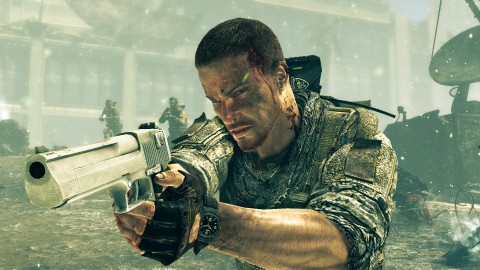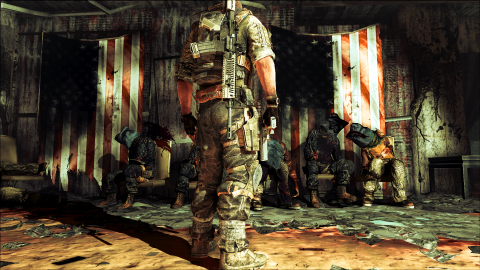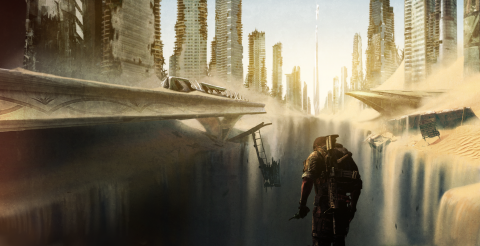When people tell me they're tired of military-themed shooters, my response to them typically is that I don't believe they're saying what they actually mean. The expression of weariness over the Modern Warfares, Battlefields and, to a much lesser degree, Homefronts of the world has little to do with a genre. When someone says they're tired of military shooters, it's not because they're about soldiers shooting things in first- or third-person. It's because few, if any of these games try to offer anything beyond the basic scope of what we've already seen them to time and time again. We experience the same blockbuster set-piece battles across the same ruined landscapes while the same chucklehead badasses read dialogue that sounds, as Charlie Brooker so succinctly described in his Guardian review of Modern Warfare 3, like it was "discarded from an old-school Schwarzenegger action movie for displaying too much swagger."

Essentially, we are tired not necessarily of games of a specific genre, but games within a genre that refuse to evolve beyond what the basic, accepted paradigm of what that genre currently is. So you can imagine my sense of terror when I began playing a recent demo of Spec Ops: The Line, and within minutes, my cohorts were cracking wise with one another and sharing multiple sentences that began, ended, and included multiple middle-doses of the word "motherfucker," before running into an apocalyptic Dubai and shooting the living piss out of a bunch of nameless "insurgents."
The exact thought that ran through my brain, in fact, was something to the effect of, "Oh, god. Oh no. This can't be what they've been doing for the last 18 months."
Yes, it's been that long since we last heard from Spec Ops: The Line. After an appearance at E3 2010 in which this Alice In Chains-laden trailer dropped, 2K Games went more or less radio silent. This is a circumstance we of the game industry have often learned to signal as impending doom. Either the grim specter of cancellation has begun hovering over a game's head, or the publisher has lost any real confidence in the title, and has scaled back its PR presence in the hope of avoiding any negative reactions prior to the release push. When an email invite to check out Spec Ops in a special two-hour demo crossed my inbox, I had honestly come close to forgetting the game even existed. When they told me I'd be able to play it the whole time, with no developer steering whatsoever, I had the distinct feeling I was being tricked, somehow. Then I started playing, and frankly, I had no idea what to think.
But as time wore on, and I played more and more of Spec Ops: The Line (five full chapters, in fact), I came to realize that my initial fears were mostly unwarranted. It wasn't that I had misjudged these characters--they were every bit the "try-hard bell-ends, desperate to highlight their gruff masculinity" that Brooker described in his Modern Warfare 3 piece--but they weren't that way out of some desperate play to make the player feel more masculine or tough. In fact, they were that way specifically so that they could become the precise opposite of that archetype as the horrors of the game's story unfolded. In effect: these characters suck on purpose, because as the game goes along, the things they will see, feel, and experience will remove any opportunity for snark, machismo, or celebration of heroism. In this situation, heroism barely even applies.
Before I delve too deeply into all of that, a brief refresher on what Spec Ops: The Line even is. The premise of the game has you following a trio of special operations soldiers into Dubai months after a tremendous sandstorm has all but decimated the region. It was a setting well highlighted by the original launch trailer, showing the once ostentatious structures of the city effectively in ruin, while opposing soldiers duke it out with each other, and battle the unstable terrain in the process. The question of why you're in Dubai, and why there are men with guns running around killing each other has only been partially touched upon previously, but in short, a U.S. Battalion known as the Damned 33rd had been sent in amid the chaos of the storms to try and evacuate the population. By all accounts, that mission failed, and the zone was deemed a no man's land--that is, until a transmission from the Colonel in charge of the operation, a man named Konrad, unexpectedly came through.

Your lead soldier has a bit of history with Konrad, having served with him years prior, and the expectation is that you and your two cohorts are there to recon the situation, and rescue any survivors that might be milling around. As it turns out, there are many survivors, but they're none-too-happy to see you.
As I mentioned before, the early goings of the game feature unnamed insurgents, a rag-tag group of men with their faces wrapped who seem especially spooked by American soldiers. There's a good reason for that, as the population has effectively found itself under marshal law, courtesy of the 33rd and Col. Konrad. In an effort to restore order to an anarchic situation, Konrad began torturing and killing civilians to demonstrate power and his own will. Even own members of his Battalion were not spared, should they have defied the will of Konrad.
It's a strikingly dark story that certainly invokes the likes of late '70s and early '80s war films like Platoon and especially Apocalypse Now (not to mention Heart of Darkness, the novel on which Apocalypse Now was based.) According to the game's writer, Walt Williams, that was very much on purpose. "What those films did to kind of rejuvenate the war film genre, we thought we had the opportunity to do the same for the modern military genre," he said. "We're looking to essentially bring consequence, the reality of war, into the interactive part of it, where you really feel what happens on both sides of the conflict. It's a bigger, darker thing than just being a hero and the bad guys disappear as you move on."
In order to achieve this, Williams and the crew at Yager have essentially dug into the notion of what choice in video games even means. Think about what the idea of morals actually means to a video game experience nowadays. Often when a player is presented a choice, it's a binary decision. One choice leads to one path, while the other, another. Choosing one might provide a specific quest line, or bring you toward a specific ending, and on the other side, you might end any chance for that quest line, or simply enact another ending. According to Williams, that's not what Spec Ops is about.
"Instead of creating this kind of systemic, binary system, where the same choice would just be repeated over and over again, with good/bad calculated at the ending, we wanted them to grow more organically out of the narrative, and the moment. We wanted the consequences to be more of an internal consequence on the player. So that maybe, early in the game, a choice a player might make wouldn't be what they'd make later in the game, after they see what the consequences are."
It sounds great in theory, but what does that even mean in practice? A prime example is one particular scenario that played out toward the end of the demo. While walking through a narrow passage outside, your team stumbles upon a trap laid by Konrad. In front of you are two people, bound and dangling from a nearby piece of wreckage. Each captive has two snipers with lasers pointed straight at their heads. You're all but surrounded by Konrad's men, and over the radio, Konrad demands you make a choice. One of the captives is a civilian who stole water, which Konrad has deemed a capital offense. The other is the solider he tasked with capturing the man, who, in a fit of rage, murdered the man's entire family during the arrest. Konrad demands you kill one of them as a test.

Thinking about this in the purest video game terms, my brain immediately decided to just pick off the soldier, since it appeared I had only two choices in front of me. According to Williams, my choice wasn't wrong, exactly, but those two weren't the only ones in front of me. I could have shot the ropes from which they dangled, or just aimed straight at the snipers and gone into battle. After shooting the soldier, my teammates actually expressed concern and even disgust at what I had done. Thinking back on it, I began to wonder how they would have reacted had I done things differently.
Of course, none of that expansion of choice means anything if there aren't tangible consequences for your actions. According to the developers on hand, the choices you do make do have an impact on the progression of the game, though they were reluctant to reveal any specifics, except to say that multiple endings do exist, and that your decisions will have some impact on the storytelling. By and large though, it's not about just trying to get a different ending, so much as it is trying to make the player think about these decisions in less "right" or "wrong" terms. As lead designer Cory Davis put it, "We feel like that type of decision more accurately reflects the types of scenarios soldiers actually have on the battlefield, as well. Rarely is there 'do a good thing versus do a bad thing.' More often than not it's a grey area."
I haven't seen enough of Spec Ops: The Line at this juncture to say whether the developers have been completely successful in achieving meaning in its moral decision making for the player, but I will say that I was, at the very least, captivated by what I played. Thinking back, I wish I'd had the understanding I do now when it comes to some of those moral decisions, as it might have made me try something different. Then again, in the heat of battle, one rarely has the time to ruminate endlessly about what to do.
And the battle is most certainly heated. As a shooter, Spec Ops is challenging, though not necessarily deep. Mechanically, it's not particularly complicated, with a fairly easy-to-use interface for weapon switching, some basic cover mechanics, and a few minor squad commands at your disposal. Perhaps there is a more eloquent way of putting this, but really, the thing about Spec Ops' combat is that it isn't about doing a lot of things. It's about surviving during frantic, sometimes utterly insane situations that can range from trying to hold out against an entire squad of enemy soldiers by yourself, to dangling off the ledge of a wrecked building while a massive sand pile caves in beneath you, and a whole building's worth of insurgents fire away at your now exposed body. It's nuts, but in a striking, sometimes exciting way.
The notion of excitement derived from combat would seem to belie the notion of what Spec Ops is trying to accomplish, but then again, even the darkest of war stories are meant to be an entertainment. This is a balance that the developers at Yager have effectively spent the last 18 months trying to achieve, the balance between the core bloodlust inherent to the shooter genre, and the more emotional thread line of the game's story. It's a tough one, to be sure. Artistically, the development team has done a great job of turning the landscape of Dubai into more than just a tourist's trip through a disaster zone. The carnage feels like it has real implications to it. When you stumble on piles of charred corpses, there is a story connection to why those bodies are there. It's not merely exploitative rubbernecking--it feels almost vital.
And yet, Spec Ops: The Line is still a game, with waves of bad guys, collectible intel items, and even battles soundtracked by rock music. Thankfully, there is at least an interesting story context for that last one. As I stumbled into one early battle, Deep Purple's "Hush" began blaring over some makeshift speakers that had been hooked up near an old TV studio, and the voice of an insane-sounding man came over the loudspeakers to talk about what was happening right then. This DJ is actually a war journalist, a psychotic, Hunter S. Thompson type who has embedded himself in this carnage to observe, and even participate in what's happening. Williams' inspiration for the character came from an unlikely film: namely, Doug E. Doug in Eight Legged Freaks. He plays a Rastafarian DJ who holes up inside his studio and effectively narrates the death and destruction around him. That is obviously a far campier story than this one, but nonetheless, it's a neat narrative mechanic however you choose to present it.
There are a number of intriguing narrative choices in Spec Ops: The Line. So much of the game is about choices as they exist within the context of this story, versus how they exist within the context of video games as we know them. The idea of choices being left to the player to understand and sit with is a great one that I hope with all hope that Yager and 2K are able to make feel precisely as meaningful as they seemingly want it to be. Likewise, I'm hopeful that Spec Ops' gameplay can be balanced alongside those moral systems, because as we all know, all it takes is one moment of abject badassery or a single repeated quicktime event to remind you that, hey, this is just a video game, and thus, there's no reason to take it seriously. It's a terribly fine line that Yager is walking here. Regardless of their eventual successes or failures, I'm frankly just glad they're even trying.